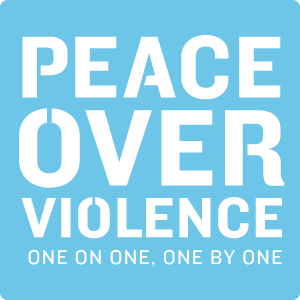From the Executive Director/CEO
October is Domestic Violence Awareness Month (DVAM) — always one of the busiest and most active times of the year at Peace Over Violence. Traditionally, this month brings our community together for our annual gathering. This year, we launched something new — Lunch Over Violence (LOV) — and the experience of coming together was comforting and inspiring.
But this DVAM has also been one of the most challenging since it was first declared in 1989. Los Angeles has endured so much — wildfires, ICE raids, unrest, and uncertainty. Across the country, we’re navigating one of the most difficult landscapes in our history. Education, public health, and vital institutions are being dismantled.
At Peace Over Violence, two of our guiding messages have always been: We Take Care of Each Other & We Protect Each Other. These aren’t just slogans — they are necessities.
Government funding for domestic and sexual violence programs is shrinking. Restrictive requirements are making it harder to access support, even as the need for survivor services grows. The numbers are daunting, but it’s the people — the survivors, the families, the young people — who keep us going. Every survivor who reaches out, every student learning about consent, every family finding safety and healing reminds us why we do this work.
Meanwhile, our clients are facing new layers of fear and instability. In recent months, there have been ICE raids right outside our offices — not once, but several times. Some survivors we’ve supported have been detained and are now held in facilities like Adelanto.
Imagine being a survivor of domestic or sexual violence, finally finding the courage to seek help — and seeing immigration enforcement outside the very place that’s supposed to keep you safe. We’ve had clients cancel appointments because they were too afraid to come in. Mothers call to ask if it’s safe to bring their children. Survivors wonder if seeking help could cost them everything.
So we meet survivors where they are. If they can’t come to us, we go to them — in a coffee shop, on Zoom, wherever they feel safe. Because when someone needs help, we don’t wait — we show up.
This is the reality of our work right now: a moment when fear, instability, and injustice feel ever-present. And yet, here we are — still standing.
At Peace Over Violence, we know what it means to take care of each other.
When survivors are afraid, we stand with them.
When systems fail, we build networks of safety and care.
When resources disappear, we innovate and find a way.
Peace Over Violence is an evolving organization — we adapt, we pivot, and we rise to meet the moment. That is what resilience looks like. And it requires courage.
As Nelson Mandela said, “Courage is not the absence of fear, but the triumph over it. The brave person is not someone who does not feel afraid, but who conquers that fear.”
While politics dominate the headlines, what worries me most is what’s being whittled away — our empathy, our decency, our sense of shared responsibility. The antidote to that loss — the way we hold onto our humanity — is through one another. By caring, protecting, and gathering — together.
And the one thing we can never give up on is hope. Hope is what we hold for the survivors we serve, and for the young people whose futures we’re helping to shape. Even in the hardest times, hope reminds us that change is possible — that together, we can keep moving toward the light.
I wish us hope, and I wish us joy. As the poet Mary Oliver reminds us, “Joy is not made to be a crumb.”
